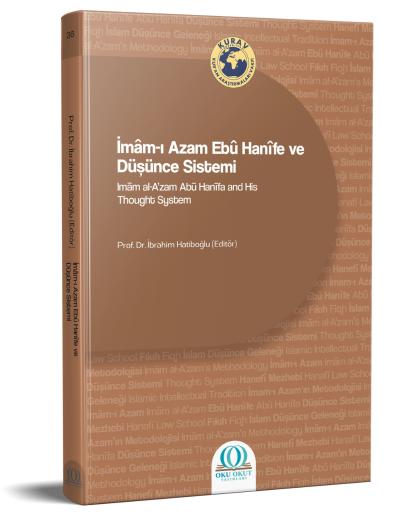Oku Okut Press reserves the right to publish and distribute the book. Permission from the publisher is required for any commercial use.
- TR
Chapter Page
Hanefî Usûlünün Genel Hadis Usûlüne Katkısı Üzerine
Authors
-
Prof. Dr. Ibrahim Hatibogluhttps://orcid.org/0000-0002-9775-2625
- TR
Summary
Değerli İlim Adamları, Sevgili Konuklar!
I/İslâmî ilimlerin, araştırmaların nesnesi hâline getirilmeye başlandığı çağdaşlaşma süreci ile birlikte, ilim dallarının mahiyetine dair değerlendirmeler de yapılmaya baş-lanmış, bu çerçevede, genelde hadislere, özelde hadis ilimleri ve usûlüne dair değişik kanaatler ortaya atılmıştır. “İmam Şâfiî’nin, her şeyin tabiî seyrettiği bir ortamda, Hz. Peygamber sünneti lehinde bir müdahalede bulunduğu, diğer sünnetlerin zamanla dışlandığı ve sadece Hz. Peygamber hadislerinin otorite hâlini aldığı bir süreç yaşan-dığı fikri” de bu tür kanaatlerdendir. Önce Batılı araştırmacıların, ardından da bazı Müslümanların savunmaya başladığı bu iddia, bazı fakîhlerin ve İmâm Mâlik gibi muhaddis-fakîhlerin hukûkî süreçte yerel uygulamaları dikkate alan tavırları örnek gösterilerek desteklenmeye çalışılmış ise de, Şâfiî öncesi dönemde, ilim denilince hadisin, âlim denilince muhaddisin kastedildiği bir ortamda özellikle “Hz. Peygamber hadisinin” dışlandığı veya ona diğer sünnetler arasında ayrıcalıklı bir yer verilmediği iddiasının, mevcut veriler ışında ispatı mümkün gözükmemektedir. Medîne ahâlisinin örf ve âdetlerinin (amelü ehl-i Medîne) hüccet olabilmesi için, aynı konuda Kur’ân’da ve Peygamberin sahih sünnetinde sarâhat bulunmaması, ahâlînin Müslüman olması ve bahis mevzû örf ve âdetlerin Peygamber tasvîbine mazhar olması belirleyici un¬surdur. Dolayısıyla, tatbikatın Hz. Peygamber’den irtibatsız bir kaynak şeklinde algı¬lanması söz konusu olamaz. Ayrıca Şâfiî öncesi dönem fakîhlerinden İmâm Mâlik, Ebû Yûsuf, İmâm Muhammed, Îsâ b. Ebân gibi kimseler, “Hz. Peygamber hadisleri” ile amel konusunda son derece istekli davrandıkları gibi, “delil kabul edilecek uygu¬lama”nın Peygamber’in söz, fiil ve takrirlerine dayandığını da kabul ederler. Bununla birlikte, Şâfiî’nin müdahalesi iddiasını savunan yazarlar, genellikle hadis literatürün¬den ve tarih kaynaklarından istifade etmek yerine, uygulamaya yönelik olarak ya¬zılmış az sayıdaki fıkıh kaynağını kullanma ve oradan genel sonuçlara ulaşma yo¬lunu tercih etmişlerdir. Oysa, amacı bir usûl inşâ etmek olmayan kazâî mahiyetteki bu eserlerden hareketle hadis ve hadis usûlü ilminin inşâ edilmeye çalışılması, kana¬atimizce yanlış neticeler doğuracaktır.
Copyright
Copyright (c) 2025 Oku Okut Press
ePub License

This work is licensed under a Creative Commons Attribution-NonCommercial 4.0 International License.
Author Biography
-
Prof. Dr. Ibrahim Hatiboglu, Yalova Univeristy, Yalova, Türkiye
About He was born on 26.01.1966 in the Karaçulha, Fethiye, Muğla. He completed primary school (in Çamköy, 1975) and Imam Hatip High School (in Fethiye, 1982). He left GU Faculty of Educational Sciences, Department of Guidance and Psychological Counseling at his own request, enrolled in MU Faculty of Theology, and graduated from there in 1989. He completed his master’s thesis titled Hadīth Learning and Teaching Etiquette According to Hadīth Methodology Sources at the same university on 03.09.1991; He completed his doctoral thesis titled Modernists’ Understanding of Sunnah in Terms of Renewal Thought in Islam on 04.10.1996. He conducted research in Egypt for six months (November 1992-April 1993) and in England for a year (October 1994-September 1995). He became an associate professor of Theology (Hadīth) with his studies on hadīth in Ottoman thought and hadīth research of orientalists (10.05.2002), and a professor with his studies on Religious Reform Thought of Bulgarian Muslims and academic hadīth studies in Turkey (21.03.2008). Starting from July 1999, he gave lectures on his field at the Bulgaria Sofia Higher Islamic Institute within the scope of the Turkish Religious Foundation for a year, and for a period at the MU Social Sciences Institute. Since July 1990, he worked as a researcher at the TDV Islamic Research Center and as an editor-in-chief at the TDV Islamic Encyclopedia. Nearly seventy copyright articles have been published. Lecturer at Uludağ University Faculty of Theology (21.11.2002–17.02.2012); He served as dean at Çanakkale Onsekiz Mart University Faculty of Theology (24.04.2009-02.05.2011). Then, he served as the founding dean at Yalova Islamic Sciences Faculty (24.05.2011-03.04.2013). He was appointed as a member of the Council of Higher Education (YÖK) on 08.10.2012 and as a member of the Executive Board between 03.04.2013 and 07.10.2016. After this duty ended, he returned to his position as a lecturer at Yalova University Faculty of Islamic Sciences. He is currently carrying out the Turkish Academy of Sciences (TÜBA) project on the founding texts of the Ottoman scientific tradition; at the same time, he continues his doctoral studies at Istanbul 29 Mayıs University SBE Department of Philosophy as of 2021-2022. Hatiboğlu, who is the manager of the Islam through Hadīths project of the Presidency of Religious Affairs, the coordinator of twenty-four books of Anadolu University Open Education System, Theology program and the editor of the hadīth book, is the editor of the Journal of Hadīth Studies/مجلة بحوث الحديث/Hadis Tetkikleri Dergisi, an international academic refereed journal. Hatiboğlu has published national and international books, papers, articles, etc. in Turkish, Arabic and English. He has many published works. He completed his military service in Diyarbakır between March and October 1997; Hatiboğlu, who speaks good English and Arabic enough to teach in his field, is married and has two children.
Downloads
Publication Information
-
Publication TypeChapter
-
Volume
-
Pages718-728
-
Published7 January 2025
-
Series
-
Series Position7
-
Categories
Hatiboglu, Ibrahim (ed.). “Hanefî Usûlünün Genel Hadis Usûlüne Katkısı Üzerine”. Imām Al-Aʿzam Abū Hanīfa and His Thought System. 7/718-728. Social Sciences Proceedings. Ankara: Oku Okut Press, 2025. https://doi.org/10.55709/okuokutyayinlari.382












